Bathroom Plumbing Basics: Essential Advice for New Homeowners
Bathroom Plumbing Basics: Essential Advice for New Homeowners
Blog Article
What're your thoughts about Essential DIY Bathroom Plumbing Tips Every Homeowner?

For new property owners, understanding and preserving shower room pipes can conserve both money and time by protecting against pricey problems down the line. Right here are some necessary washroom pipes pointers to aid you maintain everything running smoothly.
Familiarize Yourself with the Main Shut-Off Shutoff
Knowing where the main water shut-off shutoff is located in your home is essential. This enables you to rapidly shut off the supply of water in case of major leaks or during plumbing emergencies, avoiding comprehensive water damage.
Frequently Inspect for Leakages
Little leakages can result in big problems. Routinely check under sinks, around commodes, and near pipes fixtures for any indicators of leakages. Try to find moisture, little drips, or rust. Capturing and fixing leaks early can avoid more significant damages and conserve water.
Don't Ignore Slow Drains Pipes
If your sink or tub is draining gradually, it's usually an indicator of a clog developing. Addressing this very early can stop a total blockage. Utilize a plunger or a plumbing professional's snake to remove particles. Prevent using chemical drain cleansers as they can damage your pipelines gradually.
Know What Not to Flush
Toilets are not waste disposal unit. Prevent flushing anything other than bathroom tissue and human waste. Items like wipes, womanly hygiene items, and cotton swabs ought to be dealt with in the garbage to prevent obstructions and drain back-ups.
Install Strainers in Drains
Place filters in your sink and bathtub drains pipes to capture hair and other particles before they enter your pipes system. Cleaning up the filters frequently will help stop build-up and keep water moving easily.
Keep Your Water Heater
Guarantee your water heater is set to an ideal temperature (typically around 120 levels Fahrenheit) to prevent scalding and lower energy usage. Flush the container every year to get rid of sediment accumulation, which can lower the efficiency and life expectancy of your heating system.
Update Your Fixtures
If your home has older fixtures, consider upgrading to much more efficient designs. Modern bathrooms, showerheads, and faucets are made to make use of much less water while giving excellent stress, which can significantly reduce your water bill and ecological footprint.
Beware with Do It Yourself Pipes Repairs
While it's tempting to take care of all home repair work by yourself, be cautious with plumbing. Some concerns could require specialist know-how, specifically if they include major water lines or drain fixings. Working with a professional can occasionally be much more cost-efficient than DIY, specifically if it prevents additional damage.
Plan For Winter
Protect your pipelines from freezing during winter by shielding pipelines in unheated areas like basements, attics, and garages. Throughout extreme cool, allow cold water drip from taps offered by exposed pipelines to help avoid freezing.
Set Up Normal Upkeep
Consider organizing annual examinations with a qualified plumber. They can identify problems that you may miss, such as covert leakages or wear and tear on pipelines and components. Normal upkeep helps prolong the life of your plumbing system and can avoid emergency situations.
Verdict
Understanding and preserving your home's restroom plumbing can avoid many common problems. By complying with these necessary ideas, you can guarantee your restroom continues to be functional and efficient, saving you time and money in the future.
Essential Plumbing Tips for Homeowners: Keep Your Pipes Flowing Smoothly
As a homeowner, understanding the basics of your plumbing system can save you time, money, and a lot of headaches. Plumbing issues can range from minor annoyances like dripping faucets to major problems like burst pipes that cause significant damage. This guide provides essential tips to help you maintain your plumbing system and tackle common issues.
Understanding Your Plumbing System
Supply System: Brings fresh water into your home from a municipal source or a well. Drain-Waste-Vent System: Removes wastewater and vents sewer gases outside. Fixtures and Appliances: Includes sinks, toilets, showers, dishwashers, and washing machines. Basic Maintenance Tips
Regular Inspections: Periodically check for leaks, corrosion, and other signs of wear and tear. Look under sinks, around toilets, and near water heaters. Know Your Main Shut-Off Valve: In case of a major leak, you’ll need to shut off the water quickly. Ensure everyone in your household knows where the main shut-off valve is located. Prevent Frozen Pipes: In cold climates, insulate exposed pipes and let faucets drip during extreme cold to prevent freezing. Use Strainers: Install strainers in sinks and tubs to catch hair, food particles, and other debris that can cause clogs. Common Plumbing Issues and Solutions
Clogged Drains:
Prevention: Avoid pouring grease down the drain and use drain screens to catch debris. DIY Fix: Use a plunger or a plumbing snake to clear minor clogs. For stubborn clogs, a mixture of baking soda and vinegar can sometimes help. Leaky Faucets:
Prevention: Replace washers and seals regularly. DIY Fix: Turn off the water supply, disassemble the faucet, and replace worn parts.

Book Your Appointment Report this page